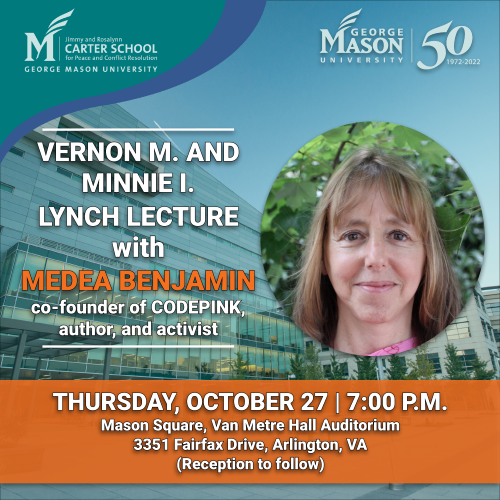By: Amanda Peña
Walking into the auditorium, there is a woman dressed in a pink sweater, pink belt, and pink boots. She sits with others as she prepares to speak to the crowd. On the evening of October 27th, the Jimmy and Rosalynn Carter School for Peace and Conflict held its inaugular Vernon M. and Minnie I. Lynch Lecture, and the first in-person Lynch lecture since the outbreak of COVID, with Medea Benjamin, co-founder of CODEPINK.
Medea Benjamin and CODEPINK
Benjamin co-founded CODEPINK in 2002 as a response to injustices around the world. CODEPINK is a grassroots organization run by women whose overarching goal is to promote peace. The organization hopes to bring awareness to different global conflicts through nonviolent action like civil resistance and interacting with government representatives. Members of this organization agree that any act of violence made may negate the good done in their mission. Some of the issues CODEPINK mentions on their website and are working towards include the Good Neighbor policy of improved relations between the U.S. and Latin American region; ending greenhouse gas emissions resulting from war; and holding individuals of power accountable for war crimes.
Lynch Lecture and Ukrainian War
During the Lynch Lecture, Benjamin highlighted another focus of the organization: the war in Ukraine. She spoke out against Russia’s actions, briefly mentioned a book she co-authored on the topic titled, War in Ukraine: Making Sense of a Senseless Conflict, then began a 20-minute video about the conflict. The video spoke on the beginnings of the war, where the war is now, and the war’s effects on Ukrainians. She concluded this section by discussing the effects of the war within the United States, most notably, its influence on inflation here and in other parts of the world. In her video, Benjamin stated the organization does not intend to ‘justify or excuse Russia’s invasion of Ukraine because we do not think it is justifiable or inexcusable’ (0:55-1:04). Benjamin criticized both the U.S.’s role in NATO’s expansion and Russia’s 2014 invasion of Crimea - which eventually led to the war in Ukraine. In this video, Benjamin blamed NATO for these invasions, citing NATO’s promises to Ukraine and Georgia to become NATO members, which eventually led to the Russian attack. Russian President Putin has, in mulitple contexts, deemed former Soviet Union countries joining NATO as an unforgivable ‘red line.’
The last 30 minutes of the Lynch Lecture were reserved for Benjamin to answer questions from the the audience. In her answers to end the war in Ukraine, Benjamin suggested world leaders speak with Russian President Vladimir Putin, stating “most wars end at the negotiating table.” Benjamin emphasized the importance of peace talks and how they are necessary in resolving conflicts. Her call to action was to move away from the opinions of political parties, but rather to hear from nonpartisan organizations and individuals instead. At the end of the Lynch Lecture, as the final call to action, Benjamin asked for humans to settle our differences in order to determine our future, and to celebrate when others speak up.
Benjamin and Her Controversies
Having Benjamin as the Lynch Lecture’s guest speaker did not come without criticism from the Carter School community. The co-founder of CODEPINK is known to hold controversial stances on highly politicized issues. These include her ongoing sympathizing with the Russian, Chinese, and Cuban governments and media outlets. The erasure of violent wrongdoings of these regimes (e.g. Russia) in order to push a rhetoric that is anti-US is dangerous and may cause more harm.
During her presentation, Benjamin seemingly cherry-picks which parts of a conflict to highlight, one reason her presentation appeared very biased. For example, while Benjamin’s video highlights portions of Russia's violent actions towards Ukrainians, she also finds fault with the U.S. and the role it played in the conflict. While providing context in any given conflict is necessary, Benjamin’s choice here did vindicate the actions of the Russian government because, she claims, Russia’s violent behavior happened to be ‘the natural progression of the conflict.’ Statements such as these appear to deny the agency of the Russian government in creating and maintaining violent conflict, instead casting the government as a reactionary force and its engagement with Ukraine as the sole fault of the US.
Many Carter School students and faculty members were surprised to learn it would be Benjamin who was named as the guest speaker of the Lynch Lecture. This resulted in some contention within the school–to the point where some students sent a letter to the Dean’s office arguing Benjamin should not participate in a high profile Carter School event such as this. In this letter, students mentioned how certain actions of Benjamin and CODEPINK on social media and other areas of the internet make them think the organization sympathizes with authoritarian regimes. These students were also interested in learning about how the organization is funded and who helps fund it, as that information has yet to be publicly disclosed.
Despite all of this, it is incredibly important to recognize the freedom of expression and the diversity of thought. Even though many did not agree with Benjamin on her perspective of the conflict and how she came to her conclusions, it was necessary to hear a different point of view, especially on such a heartbreaking conflict.
You can view the Lynch Lecture in its entirety here.


